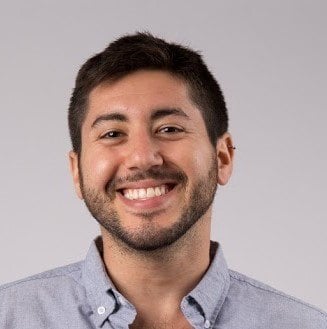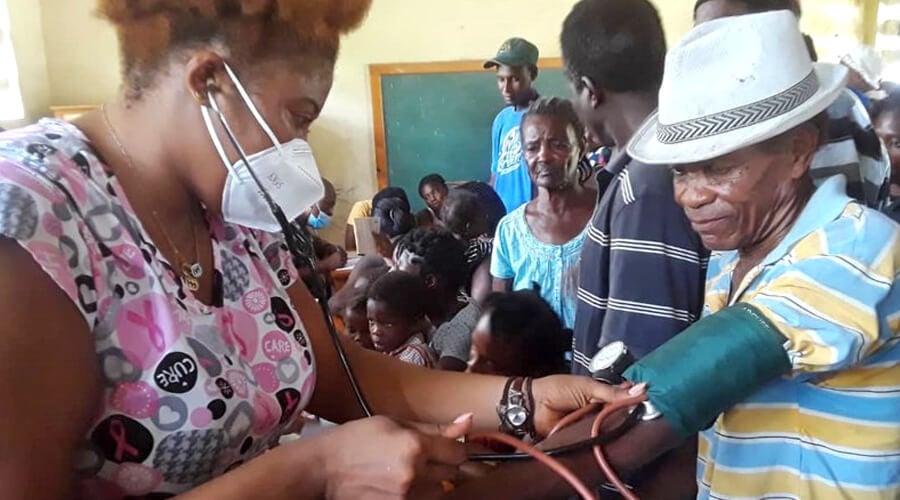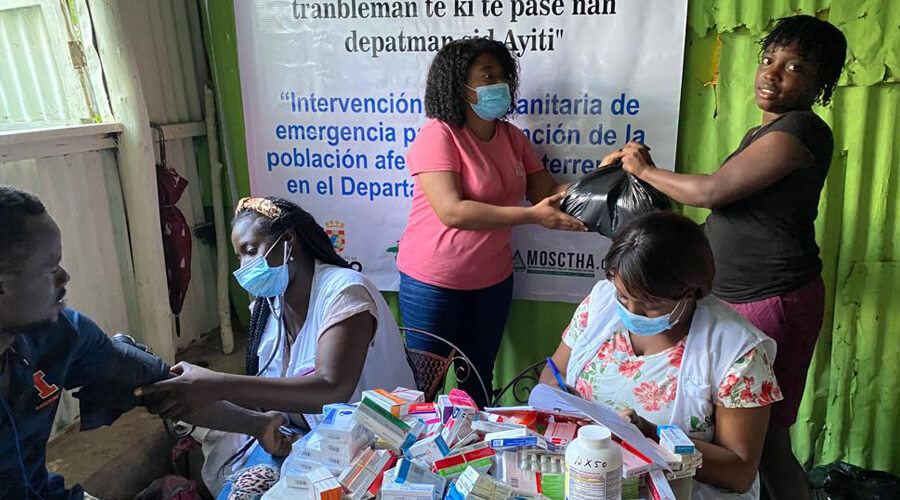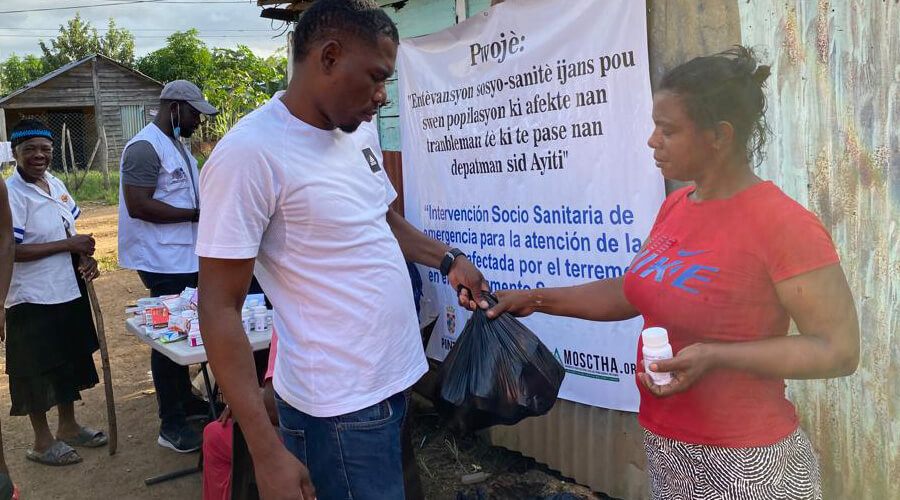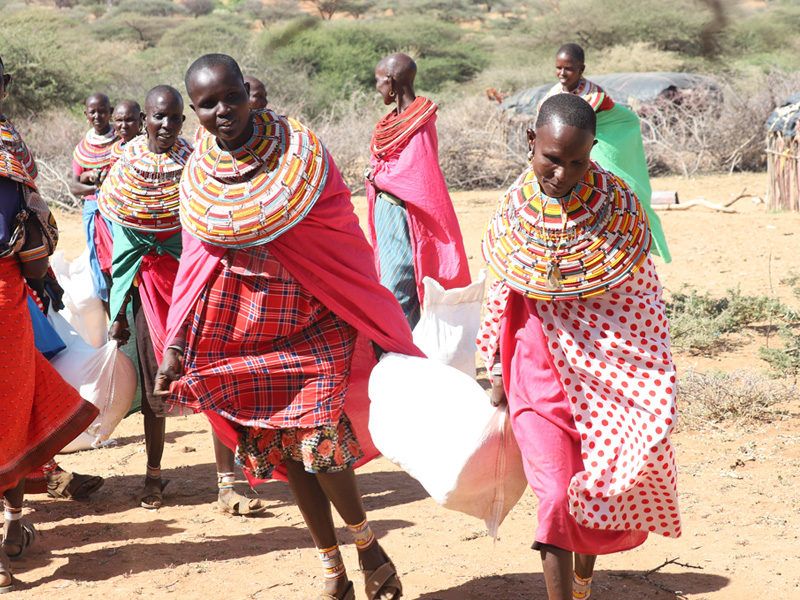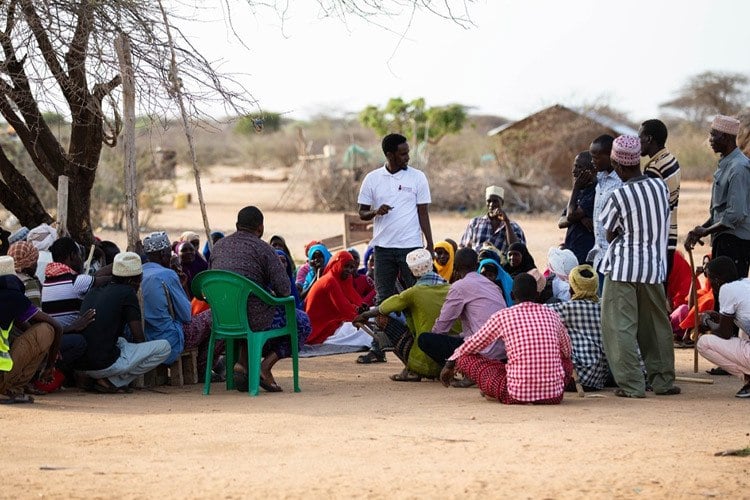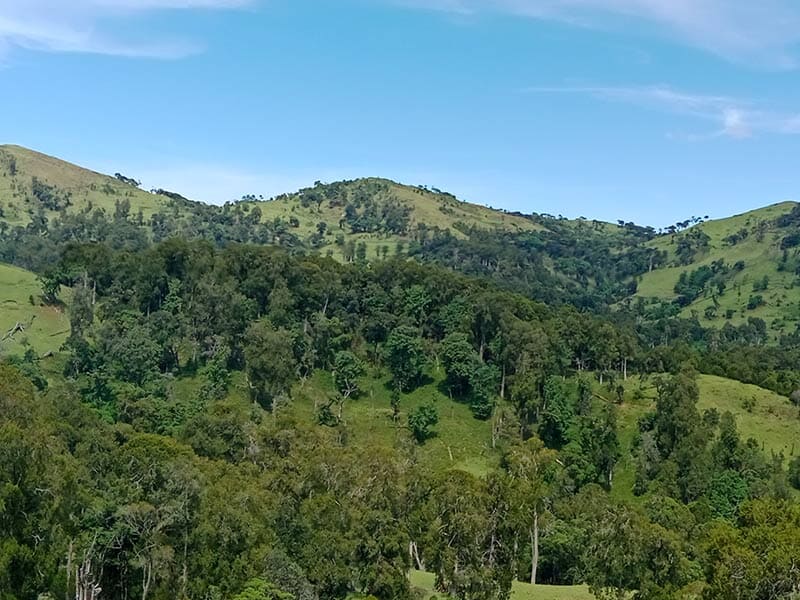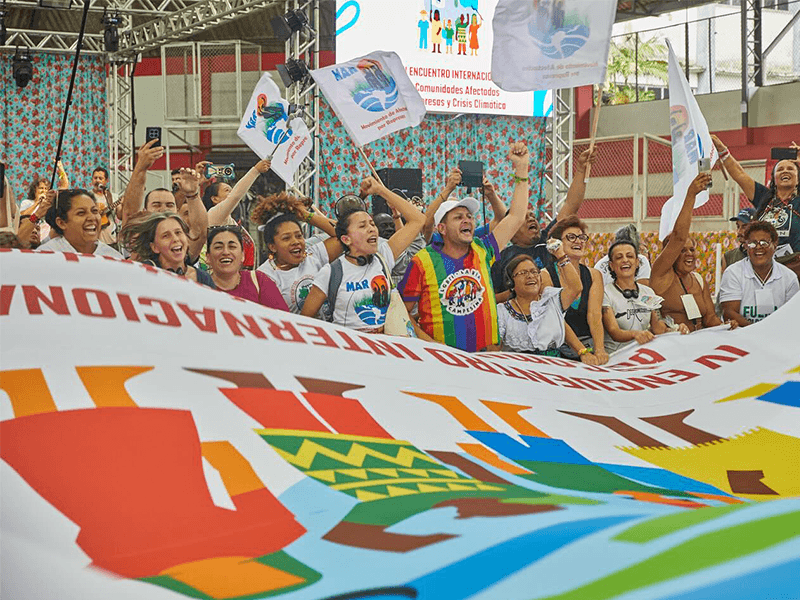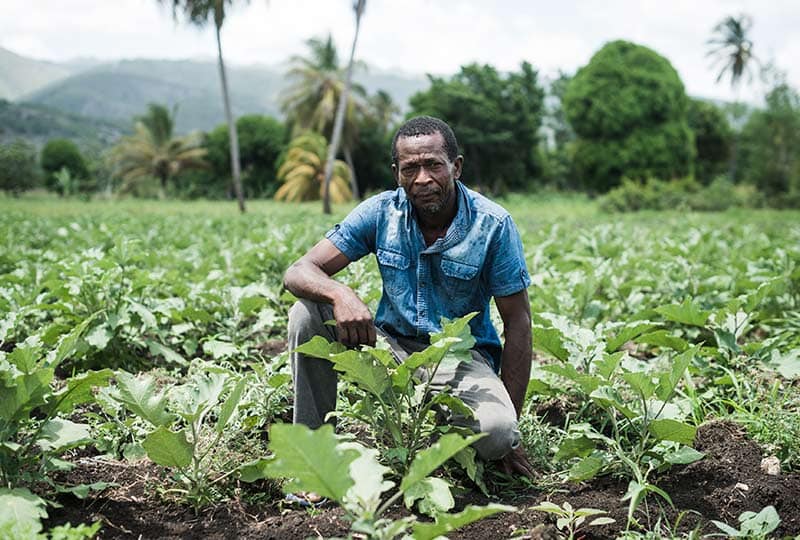At 8:30 a.m. on August 14, 2021, a massive, 7.2 magnitude earthquake struck southern Haiti, its epicenter in the heart of a rural region home to many of the country’s poorest communities. Globally, it was the deadliest natural disaster of 2021, with nearly 2,500 people killed. In Haiti, the earthquake was the latest blow to a nation still reeling from crisis after crisis.
Throughout 2020 and 2021, former Haitian President Jovenel Moïse had dismantled the country’s democratic institutions, continued to rule by decree after his term ended, and allowed healthcare and other social services to crumble. When he was assassinated last year, Haiti’s government effectively ceased to function, and violent, politically-backed gangs took power. After the earthquake destroyed villages and devastated farms, there was no government to step in and help people desperate for aid.
The social change organizations AJWS supports in Haiti did not hesitate to fill this void. These local activists leaped into action—distributing emergency aid including food, tents and clean water, as well as launching mobile medical clinics. For many earthquake survivors, this aid meant the difference between life and death. In the year since the earthquake, these grantee organizations have supported the most affected communities, helping people recover and rebuild.
They have also worked tirelessly to create a stable, democratic, functioning Haiti—a Haiti that can care for its people when the next disaster strikes. Working towards that goal, Haitian activists banded together to form the Commission to Search for a Haitian Solution to the Crisis, which seeks to create a transitional government, organize free elections and repair broken institutions. To support the Commission’s success, AJWS’s team helped form a coalition of individuals and organizations working to shift U.S. policy and media on Haiti. AJWS also successfully organized a meeting between Commission leaders and top U.S. government officials that resulted in the U.S. State Department urging Haiti’s current leadership to work with the Commission.
As we look back on Haiti’s tumultuous summer of 2021, here are the stories of two organizations that made an impact — and changed people’s lives.
“Our first partner to respond, to support us, was AJWS. That really brought a lot of hope. The earthquake took everything these people had. They felt there were no reasons to live. But we brought a little hope back to them.”
- Orijen Louis, Tèt Kole Ti Payizan Ayisyen
Sowing Seeds to Kickstart a New Crop
“We needed to see it with our own eyes,” says Orijen Louis, a hint of disbelief still in his voice when he recalls the earthquake.
Orijen is the executive coordinator of Tèt Kole Ti Peyizan Ayisyen, or Heads Together Peasant Farmer Movement, an AJWS grantee organization that mobilizes and fights for the rights of thousands of small-scale peasant farmers in Haiti. He was in Port-au-Prince when the disaster struck, and in minutes had mobilized his team to find out what help was needed, and then headed to the South to view the damage himself.
“So much of what peasant communities had was destroyed. Gardens and farms destroyed. Homes destroyed. It was as if the mountains moved and trapped people inside,” he says. “Huge ravines opened up in the earth. People didn’t just die from their homes collapsing. They died in their own fields.”
Orijen and his team rapidly organized a response to support peasant communities who’d lost everything in an instant. The most basic needs had to be addressed first: food, water, shelter.
“We needed to get people out of the rain,” says Orijen.
Tèt Kole quickly began distributing tarps and tents to families whose homes had collapsed. The team organized groups to bury the dead. They began transporting clean water, food and clothing to peasant families across Southern Haiti.
“Our first partner to respond, to support us, was AJWS,” says Orijen. “That really brought a lot of hope. The earthquake took everything these people had. They felt there were no reasons to live. But we brought a little hope back to them.”
The earthquake caused farmers to lose entire crops, and few had savings that would enable them to recover this devastating loss. They needed seeds to begin again — to feed their families and earn a living.
There was no time to spare, so Tèt Kole began distributing seeds that could grow and ripen quickly: black, red and white beans, cabbage, carrots, onion, spinach and more.
“School was opening in September,” says Orijen. “And people needed tuition for their children. Money to pay for everyday expenses. So these vegetables needed to be replanted immediately.”
In the months since August’s earthquake, Tèt Kole has organized multiple rounds of seed distribution, and the farmers they serve are slowly recovering. But without any assistance from Haiti’s non-functioning government, the Tèt Kole team know they can only rely on themselves and their communities — including the global AJWS community.
“Working together is part of our life, our culture. When there’s a heavy load to carry, people carry it together,” says Orijen. “The earthquake took place months ago, but there is still so much work to do. And AJWS is standing next to us. AJWS doesn’t let us go. These problems haven’t been resolved, but the support we’ve brought to these farmers has been crucial. We’re bringing hope with us.”
A Mobile Medical Clinic at the Earthquake’s Epicenter
Dr. Katia Marcelin was in the Dominican Republic when she heard the news — another earthquake had hit Haiti, and the death toll was rising. She didn’t know it yet, but within days she’d be across the border with an emergency response team of 15 medical professionals, seeing over 500 patients in just 10 days.
Dr. Marcelin works for AJWS grantee organization El Movimiento Socio Cultural Para Los Trabajadores Haitianos (MOSCTHA), a Dominican Republic-based group that advocates for the rights of Haitian migrants and their descendants—populations that have long faced discrimination and racism from the Dominican government and society at large. AJWS has supported MOSCTHA since 2001. In 2010, after a catastrophic earthquake shook Haiti and killed hundreds of thousands of Haitians, AJWS funded MOSCTHA to open a medical clinic in Southern Haiti that remains a critical component of the region’s healthcare infrastructure to this day.
For over a decade, this clinic has represented the unbreakable bonds between Haitians on either side of the border—and embodies AJWS’s mission to stand with our grantees long-term, as they face new and evolving challenges.
“The solidarity between Dominicans of Haitian descent and the people who live in Haiti is constant,” says MOSCTHA co-founder Dr. Joseph Cherubin. “It’s a permanent cultural, social and familial relationship that’s maintained from generation to generation.”
When the earth shook again in 2021, the MOSCTHA teams on both sides of the border knew they needed to respond. Dr. Marcelin, who is Haitian but has been working in the Dominican Republic for years, was called upon to join MOSCTHA’s team of doctors, nurses and psychologists. This courageous team visited communities leveled by the earthquake, providing emergency care and distributing essential medicines. The work was exhausting—physically and emotionally.
“I stayed motivated with a positive mindset to help people because I saw their desperation,” says Dr. Marcelin. “My experience was… not easy during those 10 days. To see my compatriots suffering, people in so much pain. It took so much concentration to help them.”
The team was treating patients with compounded health issues: injuries and trauma from the earthquake combined with pre-existing conditions like diabetes, and the threat of a new COVID-19 surge looming. MOSCTHA staff also distributed emergency aid like mosquito nets, food, drinking water and tents to hundreds of families.
Through some of the most challenging days of her life, Dr. Marcelin knew this was her calling.
“This work helped me to be more human,” she says.
With MOSCTHA clinics operating in both Haiti and the Dominican Republic, these front-line activists have an up-close view of the challenges facing Haiti—from overcoming decades of poverty, to repairing the country’s shattered government, to recovering from this latest natural disaster. But the MOSCTHA team refuses to give up hope for a stronger, more equitable Haiti.
“This is what our team is betting on,” says Dr. Cherubin. “Helping vulnerable people is part of our vision. We’re creating an independent system to provide health services to the most vulnerable populations. Without discrimination, and with a great human spirit.”

